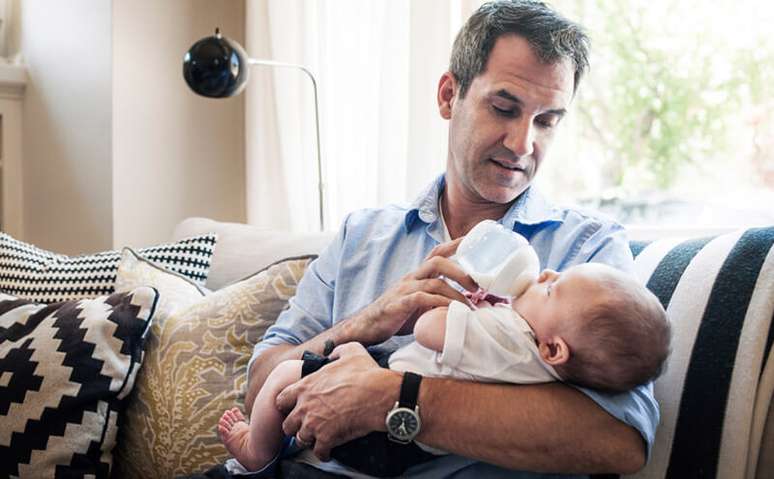The age of the father also causes gestational risks as much as that of the mother. Why isn’t it talked about much?
html[data-range=”xlarge”] figure image img.img-179076269def07dcebea96b68982ebcewz71p6sq { width: 774px; height: 479px; }HTML[data-range=”large”] figure image img.img-179076269def07dcebea96b68982ebcewz71p6sq { width: 548px; height: 339px; }HTML[data-range=”small”] image figure img.img-179076269def07dcebea96b68982ebcewz71p6sq, html[data-range=”medium”] figure image img.img-179076269def07dcebea96b68982ebcewz71p6sq { width: 564px; height: 349px; }
Oblique glances, open or veiled criticism, legitimate concerns or just disapproval: these are some of the testimonies of many patients I see every day in my office and who have decided to become mothers for the first time after the age of 40.
These women, for the most part, have built an exemplary life: they are excellent professionals, good daughters and sisters and, not infrequently, it took some time to find a partner (or companion) in whom they trusted enough to want to set up family. Others have decided to be single mothers and have all the prerequisites to fully carry out this task. Why, then, are they being judged all the time?
What happens is that pregnancy after the age of 35 is considered by the WHO (World Health Organization) to be a high-risk pregnancy. And the magnitude is not wrong: there is, in fact, a greater likelihood of problems with the mother and child in this maternal age group, especially if the mother is in poor health before becoming pregnant, if does not prepare in the year before pregnancy (yes, currently, we want every woman to prepare for one year before becoming pregnant, it is called “one year pregnancy”) and if, during pregnancy, you do not practice the necessary care so that his health remains full.
Down syndrome and Patau syndrome are a real possibility
Of course, other complications can occur, such as Down syndrome and Patau, which are more frequent in the children of women over 40 and cannot be prevented, but this does not mean that younger women cannot also father children with such syndromes.
The data available in Brazil on the number of children with Down syndrome born in recent years is not clear. One of the most reliable has shown that, in the south-east of the country, for every 10,000 children born alive, four had the syndrome and half of them were daughters of mothers over 35 years old.
But will all women over 40 who get pregnant have gestational problems? NO. Women are increasingly healthy, informed and supported by Medicine.
It is essential to know that women of any age who have pre-existing conditions should be treated before becoming pregnant. A 25 year old woman with obesity or high cholesterol or endometriosis or fibroids or polycystic ovary syndrome (PCOS) or metabolic syndrome or diabetes or hypertension or vascular problem or heart disease or autoimmune disease or thrombophilia or whatever disease there is needs to be treated first conception – also because many of these conditions will not even allow you to get pregnant.
If she becomes pregnant with certain metabolic or cardiovascular problems, for example, she can develop pre-eclampsia or gestational diabetes at any age. Over the age of 40, of course, the situation can arise more easily, because the probability of having an installed disease is greater – apart from the fact that the quality of your oocytes is no longer the same as it was in your 20s.
Hence, the medical consensus is that all women prepare for pregnancy, have prenatal care, monitor their diet, engage in regular supervised physical activity, have all appropriate supplements, take care of sleep and mental health and emotional and keep an eye on intestinal conditions. With up-to-date tests, pregnancy will be smooth, at any age.
It’s not just a mother problem.
But are age-induced gestational problems unique to the mother? Why hardly anyone talks about the father’s role in this process?
More than talking about the maternal role in pregnancy and weight at 40 (and beyond), I want to underline that there is very little talk about parental responsibility beyond the age of 35-40.
Men are able to bear children throughout their lives – of course, male fertility also decreases with age, but they manage to have children even at 70 and beyond.
A study presented a few years ago at the annual meeting of the European Society of Human Reproduction and Embryology in Vienna, Austria showed that sperm quality decreases over time, especially after the age of 51.
Other international studies have also indicated that babies born to older parents are more susceptible to low birth weight, premature delivery and low Apgar scores (a test that evaluates five signs in newborns – reflexes, baby color, heart rate, muscle tone and respiratory effort – in the first minutes of life and will indicate to doctors what clinical measures will need to be taken later).
Men need guidance too
I am still amazed to learn that there are gynecologists who do not encourage their patients to guide their partners to seek a urologist when the couple wants to get pregnant, to perform the necessary tests for proper integration and care necessary for conception.
Even men who smoke, abuse alcohol, are overweight or obese, diabetic, hypertensive, with hypercholesterolemia, stressed can have impaired fertility and interfere with the health of the child – it is always worth remembering that 50% of our genetic load comes from the father and the remaining 50% from the mother.
Women over 40 can have children, with responsibility and medical care. Men too. But it’s time for them to be looked at with more empathy and with more questions.
Mariana Rosario is a doctor specialized in Gynecology, Obstetrics and Mastology. You are a member of the clinical staff of the Albert Einstein Hospital, in São Paulo.
Source: Terra
Ben Stock is a lifestyle journalist and author at Gossipify. He writes about topics such as health, wellness, travel, food and home decor. He provides practical advice and inspiration to improve well-being, keeps readers up to date with latest lifestyle news and trends, known for his engaging writing style, in-depth analysis and unique perspectives.








